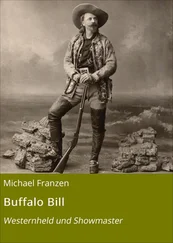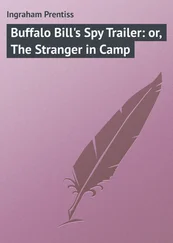Bill Buffalo - The Adventures of Buffalo Bill
Здесь есть возможность читать онлайн «Bill Buffalo - The Adventures of Buffalo Bill» — ознакомительный отрывок электронной книги совершенно бесплатно, а после прочтения отрывка купить полную версию. В некоторых случаях можно слушать аудио, скачать через торрент в формате fb2 и присутствует краткое содержание. ISBN: , Жанр: foreign_prose, foreign_antique, foreign_language, на английском языке. Описание произведения, (предисловие) а так же отзывы посетителей доступны на портале библиотеки ЛибКат.
- Название:The Adventures of Buffalo Bill
- Автор:
- Жанр:
- Год:неизвестен
- ISBN:http://www.gutenberg.org/ebooks/38840
- Рейтинг книги:3 / 5. Голосов: 1
-
Избранное:Добавить в избранное
- Отзывы:
-
Ваша оценка:
- 60
- 1
- 2
- 3
- 4
- 5
The Adventures of Buffalo Bill: краткое содержание, описание и аннотация
Предлагаем к чтению аннотацию, описание, краткое содержание или предисловие (зависит от того, что написал сам автор книги «The Adventures of Buffalo Bill»). Если вы не нашли необходимую информацию о книге — напишите в комментариях, мы постараемся отыскать её.
The Adventures of Buffalo Bill — читать онлайн ознакомительный отрывок
Ниже представлен текст книги, разбитый по страницам. Система сохранения места последней прочитанной страницы, позволяет с удобством читать онлайн бесплатно книгу «The Adventures of Buffalo Bill», без необходимости каждый раз заново искать на чём Вы остановились. Поставьте закладку, и сможете в любой момент перейти на страницу, на которой закончили чтение.
Интервал:
Закладка:
We started off at about eleven o’clock, and had ridden about seven miles, when, while we were on a big plateau back of Cedar Bluffs, we suddenly discovered a band of Indians coming out of the head of the ravine half a mile distant, and charging down upon us at full speed. I thought that our end had come this time. Simpson, however, was equal to the occasion, for with wonderful promptness he jumped from his jaded mule, and in a trice shot his own animal and ours also, and ordered us to assist him to jerk their bodies into a triangle. This being quickly done, we got inside the barricade of mule-flesh, and were prepared to receive the Indians. We were each armed with a Mississippi yager and two revolvers, and as the Indians came swooping down on our improvised fort, we opened fire with such good effect that three fell dead at the first volley. This caused them to retreat out of range, as with two exceptions they were armed with bows and arrows, and therefore to approach near enough to do execution would expose at least several of them to certain death. Seeing that they could not take our little fortification or drive us from it, they circled around several times, shooting their arrows at us. One of these struck George Wood in the left shoulder, inflicting only a slight wound, however, and several lodged in the bodies of the dead mules; otherwise they did us no harm. The Indians finally galloped off to a safe distance, where our bullets could not reach them, and seemed to be holding a council. This was a lucky move for us, for it gave us an opportunity to reload our guns and pistols and prepare for the next charge of the enemy. During the brief cessation of hostilities Simpson extracted the arrow from Wood’s shoulder, and put an immense quid of tobacco on the wound. Wood was then ready for business again.
The Indians did not give us a very long rest, for with another desperate charge, as if to ride over us, they came dashing toward the mule barricade. We gave them a hot reception from our yagers and revolvers. They could not stand or understand the rapidly repeating fire of the revolver, and we checked them again. They circled around us once more, and gave us a few parting shots as they rode off, leaving behind them another dead Indian and a horse.
For two hours afterward they did not seem to be doing anything but holding a council. We made good use of this time by digging up the ground inside the barricade with our knives, and throwing the loose earth around and over the mules, and we soon had a very respectable fortification. We were not troubled any more that day, but during the night the cunning rascals tried to burn us out by setting fire to the prairie. The buffalo grass was so short that the fire did not trouble us much, but the smoke concealed the Indians from our view, and they thought they could approach to us without being seen. We were aware of this, and kept a sharp lookout, being prepared all the time to receive them. They finally abandoned the idea of surprising us.
Next morning, bright and early, they gave us one more grand charge, and again we “stood them off.” They then rode away half a mile or so, and formed a circle around us. Each man dismounted and sat down, as if to wait and starve us out. They had evidently seen the advance train pass on the morning of the previous day, and believed that we belonged to that outfit, and were trying to overtake it. They had no idea that another train was on its way after us.
Our hopes of escape from this unpleasant and perilous situation now depended upon the arrival of the rear train, and when we saw that the Indians were going to besiege us instead of renewing their attacks, we felt rather confident of receiving timely assistance. We had expected that the train would be along late in the afternoon of the previous day, and as the morning wore away we were somewhat anxious and uneasy at its nonarrival.
At last, about ten o’clock, we began to hear in the distance the loud and sharp reports of the big bull-whips, which were handled with great dexterity by the teamsters, and cracked like rifle shots. These were welcome sounds to us, as were the notes of the bagpipes to the besieged garrison at Lucknow when the re-enforcements were coming up, and the pipers were heard playing “The Campbells are Coming.” In a few moments we saw the head wagon coming slowly over the ridge which had concealed the train from our view, and soon the whole outfit made its appearance. The Indians observed the approaching train, and assembling in a group, they held a short consultation. They then charged upon us once more, for the last time, and as they turned and dashed away over the prairie, we sent our farewell shots rattling after them. The teamsters, seeing the Indians and hearing the shots, came rushing forward to our assistance, but by that time the redskins had almost disappeared from view. The teamsters eagerly asked us a hundred questions concerning our fight, admired our fort, and praised our pluck. Simpson’s remarkable presence of mind in planning the defense was the general topic of conversation among all the men.
When the teams came up we obtained some water and bandages with which to dress Wood’s wound, which had become quite inflamed and painful, and we then put him into one of the wagons. Simpson and myself obtained a remount, bade good-by to our dead mules which had served us so well, and after collecting the ornaments and other plunder from the dead Indians, we left their bodies and bones to bleach on the prairie. The train moved on again, and we had no other adventures, except several exciting buffalo hunts on the South Platte near Plum Creek.
II
Rounding Up Indians
In October, 1867, General Sheridan organized an expedition to operate against the Indians who infested the Republican River region. “Cody,” said he, “I have decided to appoint you as guide and chief of scouts with the command. How does that suit you?”
“First rate, General, and thank you for the honor,” I replied, as gracefully as I knew how.
The Dog Soldier Indians were a band of Cheyennes and unruly, turbulent members of other tribes, who would not enter into any treaty, or keep a treaty if they made one, and who had always refused to go upon a reservation. They were a warlike body of well-built, daring, and restless braves, and were determined to hold possession of the country in the vicinity of the Republican and Solomon rivers. They were called “Dog Soldiers” because they were principally Cheyennes – a name derived from the French chien , a dog.
On the 3d of October the Fifth Cavalry arrived at Fort Hays. General Sheridan, being anxious to punish the Indians who had lately fought General Forsyth, did not give the regiment much of a rest, and accordingly on the 5th of October it began its march for the Beaver Creek country. The first night we camped on the south fork of Big Creek, four miles west of Hays City. By this time I had become pretty well acquainted with Major Brown and Captain Sweetman, who invited me to mess with them on this expedition, and a jolly mess we had. There were other scouts in the command besides myself, and I particularly remember Tom Renahan, Hank Fields, and a character called “Nosey,” on account of his long nose.
The next day we marched thirty miles, and late in the afternoon we came into camp on the south fork of the Solomon. At this encampment Colonel Royal asked me to go out and kill some buffaloes for the boys.
“All right, Colonel; send along a wagon or two to bring in the meat,” I said.
“I am not in the habit of sending out my wagons until I know that there is something to be hauled in; kill your buffaloes first, and then I’ll send out the wagons,” was the Colonel’s reply. I said no more, but went out on a hunt, and after a short absence returned and asked the Colonel to send out his wagons over the hill for the half-dozen buffaloes I had killed.
Читать дальшеИнтервал:
Закладка:
Похожие книги на «The Adventures of Buffalo Bill»
Представляем Вашему вниманию похожие книги на «The Adventures of Buffalo Bill» списком для выбора. Мы отобрали схожую по названию и смыслу литературу в надежде предоставить читателям больше вариантов отыскать новые, интересные, ещё непрочитанные произведения.
Обсуждение, отзывы о книге «The Adventures of Buffalo Bill» и просто собственные мнения читателей. Оставьте ваши комментарии, напишите, что Вы думаете о произведении, его смысле или главных героях. Укажите что конкретно понравилось, а что нет, и почему Вы так считаете.












